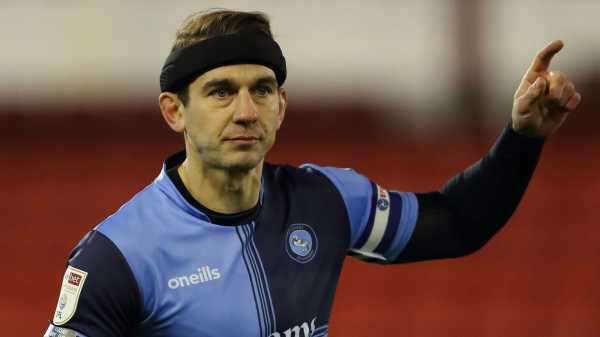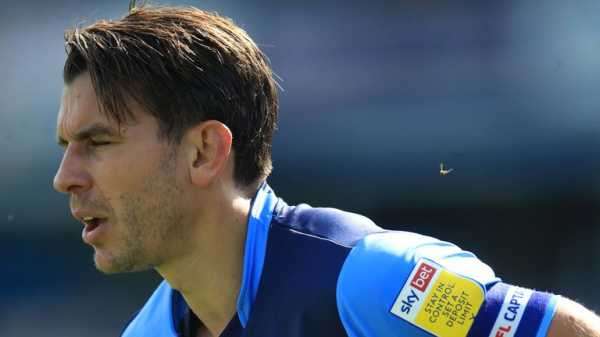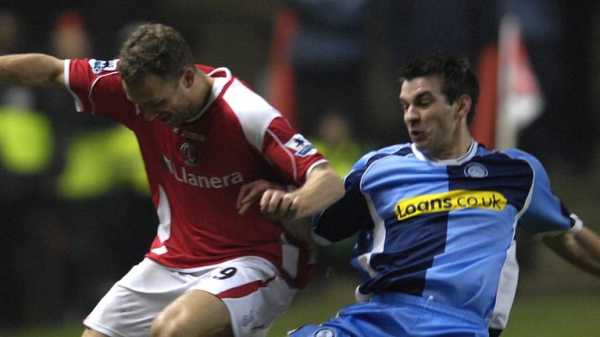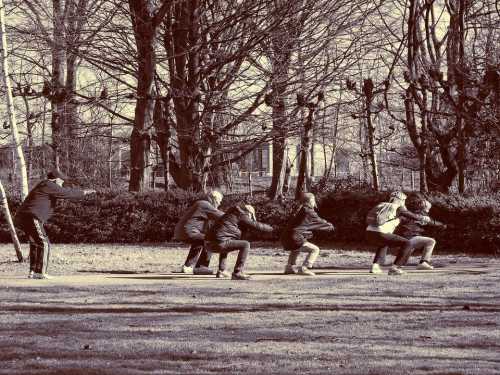
“I was trying to go straight to the tunnel, but I kept veering off to the right towards the away end. I was struggling to get my sense of direction.
“The doctor told me afterwards that when I was trying to go down the tunnel, which is quite a narrow one at Exeter, I was hitting both sides of it trying to get back to the changing rooms.
“I was quite agitated and really irritable, and quite overly emotional about the whole situation, which is one of the main signs of concussion.”
For Matt Bloomfield, it was a matchday that started like any other during a career that had spanned nearly two decades.
Trending
- ‘Incandescent’ Everton complain to PL over referee decisions
- Abramovich ‘trying to broker peace’ between Russia & Ukraine
- British Boxing Board to investigate Taylor-Catterall scoring
- FIFA in advanced talks to suspend Russia until further notice
- Merson Says: Chelsea would have won if Mendy stayed on
- Ref Watch: ‘It’s handball by Rodri – VAR got seduced by angle’
- Packers to play in London for first time
- Transfer Centre LIVE! Mbappe, Ronaldo, Tielemans latest
- Chalobah reveals injury | Hasselbaink: It was a red card
- Spartak Moscow to be removed from Europa League by UEFA
- Video
- Latest News
It was a Carabao Cup first-round trip to Exeter with Wycombe last August, and the-then 37-year-old’s only thoughts were to use the appearance as a way to force himself into boss Gareth Ainsworth’s plans going forward.
One unlucky accident later, however, and everything changed.
Also See:
“Going into the game all I really wanted to do was play well and get myself into the manager’s thinking for the game at the weekend,” Bloomfield tells Sky Sports.
“It started off okay, but in about the 41st minute Joe Jacobson tried to take a quick free-kick and, unfortunately, the ball hit me in the back of the head and knocked me to the ground.
“Immediately I knew I was a bit dizzy and dazed, and the doctor said I had to come straight off.
“I remember trying to get off the pitch, but I don’t remember walking down the tunnel and hitting both sides of it. I remember being in the changing room after the game, but I don’t remember being as agitated and emotional as everyone has said I was.
“Before the game, I was fine to play football and after I wasn’t. This was the one that finished my career.”

- League One table | Wycombe news
Concussion wasn’t a new experience for Bloomfield. A combative midfielder who has spent pretty much his entire career at Wycombe reckons that he had already suffered four of them in the years leading up to the one at Exeter.
Previously, he had been able to shake them off. But on this occasion that wasn’t the case.
“By the time I had gotten back the next day I could tell things weren’t right,” he says. “It was hanging on a lot longer than in the past. Every time I had them before I had recovered really quickly and felt fine.
“This time I could tell was different. My mood was affected and my energy was really low.
“One of the lights of my life is sitting with my two girls in the evening reading stories, but I struggled to see the light in it in the days and weeks after. Everything was a massive effort, and everything had gone kind of grey.
“I also tried to go on the teacup rides with my girls a while after the incident and I got really dizzy.
“A while later I tried to go out onto my bike, which is something I love doing, but not long after setting out I had to turn around and go home. I had balance issues which have never happened before, and I really struggled to concentrate on anything.
“I knew this was different and it needed looking into. I was really lucky that the doctor at Wycombe was pushing for me to look deeper into it, because he knew it wasn’t right and I knew it didn’t feel right.
“That’s when we started doing a few more investigations and going to speak to some more experts to get some more information. That’s what ultimately led me to the path I’m down now.”
It was a road that eventually led to Bloomfield’s retirement from the game. Now 38, he knows he had a good innings, but it’s not the way he wanted to go out.

Image: Bloomfield made all but one of his career appearances for Wycombe
“I loved my career and the thought of not doing it anymore was heart-breaking,” he admits. “Eventually choosing to retire was quite a tough decision because I was so desperate to keep playing.
“We spoke to more people to try and gain as much knowledge on the subject as we could. But the issues wouldn’t go away.
“My only motivation at the start of the season was to play as many games as I could and try to earn a new contract. I’ve put everything into my career and the idea of stopping filled me with dread.
“But eventually my responsibility to my girls and to my family came to the fore, and I was left with no other option than to stop playing.
“All good things have to come to an end. I would have loved to have finished my career in a different way, but you can’t choose everything in life and mine ended the way it did.”
Nearly six months after the incident, Bloomfield eventually announced his retirement at the start of February.
And the next step of his career is already under way. He can barely thank Wycombe’s owners and management for how supportive they have been. Having already taken his B and A coaching licences – while currently undergoing a diploma in football management – he has taken a role with Ainsworth’s coaching team to continue an affiliation with the club that started when he joined from boyhood team Ipswich in 2003.
“I can’t overstate how supportive the club were,” he says. “There were so many messages from supporters, and the owner Rob Couhig and his nephew Pete have been so emotionally supportive and they’ve always been there when I’ve wanted to chat.
“The gaffer has embraced me on his coaching staff and given me responsibility to start on this journey. They’re all such good people who care about who they work with and employ. I hope my performances on the pitch and how I can support them now off the pitch can repay them.
“It all ended so abruptly and I do miss the dressing room and I do miss training every day and pushing my body. Although I am still in the gym every morning to keep fit!
“But it’s been just over six months now so I’m getting used to it. I think like a coach and act like a coach now. I want to throw myself into this career. There are a lot of good coaches and football people out there, and if you want to be good at something you have to put in the hard yards.
“I always wanted to drain every last bit of energy out of my body for my playing career, and now I want to do the same in coaching to be the best I can be.”
There are still difficult moments to remind him the problem hasn’t gone away. It has led to Bloomfield trying to use his experiences to try and influence change within the game.
“I’m extremely jumpy when there are balls flying around,” he says. “I’ve spent 21 years on a training ground and it’s never been a problem, but now I’m really sensitive to the situation and have to be really on my guard.
“Every now and then there’s a simple word I won’t remember and it’ll frustrate me a lot trying to get it out. That was never there before.
“I just think concussion is something we need to be more aware of as footballers. There needs to be a lot more education in place if you have concussion in terms of the recovery period and even being honest with yourself if you’re feeling any symptoms.
“We are programmed to play through injuries and get back out there because points and results are everything. We try to ignore everything and get on with it. But when it comes to brain health you have to take it seriously, because there is nothing more important.”

Highlights of the Sky Bet League One match between Accrington Stanley and Wycombe Wanderers.
There has been some change within the game recently, with concussion substitutions introduced to try and offset the impact of such injuries, as well as the reduction of heading in training.
But there are still controversies that concern Bloomfield, with recent issues involving Sadio Mane at AFCON, and Robin Koch being kept on during Leeds’ Premier League game with Manchester United, which led to an extremely strong response from British head injury charity Headway.
He believes there is still a long way to go.
“I think concussion subs need to change,” he says. “I know physios are supposed to have an unlimited time to assess a head injury, but there is still a crowd there, 21 other players, two managers and other people who are trying to influence things.
“For me, if there’s a suspected concussion then a player should be removed from play and a sub brought on. Then they should have 10 or 15 minutes in a sterile environment to be assessed under a bright white light, where they can be honest about their feelings and what they are going through.
“I’m still seeing players left on the pitch. We saw it [with Mane] at AFCON when he stayed on then collapsed a while later. There has been a step forward, but we need a bigger step forward.
“All the stakeholders of the game need to put a lot more money into the research. It has been acknowledged for a while now that there’s a link between being a footballer and getting dementia later in life. It feels there isn’t enough information around it still and on how we can try and prevent it.
“I’m never going to sit here and say heading shouldn’t be part of the game. With anything in life, there is a risk attached to being a footballer. They are part of what makes the game what it is.
“But if we can mitigate against some of the risks then that has to happen. Heading is a skill and it needs to be practised, but the rules around training have been brought in for a reason and it’s certainly something we try to adhere to at Wycombe. I’d like to think everyone else is being as strict as we are.
“There is no amount of heading skill that’s worth giving yourself long-term damage. This is people’s long-term brain health we’re talking about.”
Bloomfield admits that the current landscape has led to some worries for his personal future, not so much for him but for his loved ones.
“I am trying not to get too caught up on it, but it does concern me,” he says. “My granddad wasn’t a player, but he suffered with dementia later in life and it was horrible seeing what he went through.
“It’s not so much myself that I’m worried about, it’s about the impact it has on your family. They are the ones who suffer.
“I just want to use whatever influence I have to try and help increase the amount of research and the protocols, so others don’t have to live with the concerns I live with.”
It may not have ended how he would have liked, but after 558 career appearances – all but one for Wycombe – 42 goals and four promotions, he can start to look back proudly on a brilliant career.
And when asked to pick one moment that stood out in particular, it was pretty obvious which one he was going to choose.

Image: Bloomfield captained Wycombe to a League One play-off final victory at Wembley in July 2020
“There was the testimonial, avoiding relegation out of League Two in 2014 and other promotions, but nothing even compares to that night at Wembley,” he says.
“July 13, 2020. It was incredible to reach the Championship, because I’d made peace with the fact I’d never get there in my career. It was an unbelievably euphoric high.
“It helped shake off some of the ghosts of 2015 when I missed a penalty in the League Two play-off final and we lost to Southend. That was one of the lowest moments of my life, let alone my career. So to go back five years later and experience the other side of it made it all the more enjoyable.
“To do it with a club like Wycombe Wanderers, getting them to that level for the first time in their 133-year history, and to do it as captain. It meant so much and fulfilled a boyhood dream.”

Win £250,000 with Super 6!
Another Saturday, another chance to win £250,000 with Super 6. Play for free, entries by 3pm.
Sourse: skysports.com






